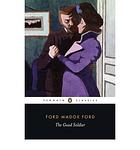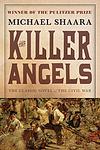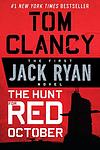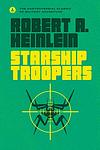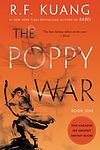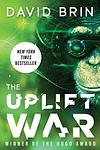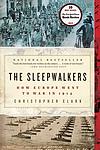The Greatest "Fiction, Military" Books of All Time
Click to learn how this list is calculated.
This list represents a comprehensive and trusted collection of the greatest books. Developed through a specialized algorithm, it brings together 300 'best of' book lists to form a definitive guide to the world's most acclaimed books. For those interested in how these books are chosen, additional details can be found on the rankings page.
Genres
The Military category of books encompasses a wide range of literature that focuses on the armed forces, their operations, and the individuals who serve in them. This genre includes both fiction and non-fiction works that cover topics such as military history, strategy, tactics, and personal accounts of soldiers' experiences. Military books often explore themes of bravery, sacrifice, and the impact of war on individuals and society. They provide readers with a glimpse into the world of the military and the challenges faced by those who serve their country.
Countries
Date Range
Reading Statistics
Click the button below to see how many of these books you've read!
Download
If you're interested in downloading this list as a CSV file for use in a spreadsheet application, you can easily do so by clicking the button below. Please note that to ensure a manageable file size and faster download, the CSV will include details for only the first 500 books.
Download-
1. The Good Soldier by Ford Madox Ford
"The Good Soldier" is a tragic tale of two seemingly perfect couples: an American couple and an English couple, who meet at a German spa and share a nine-year friendship. However, underneath the surface, their relationships are far from ideal, filled with infidelity, lies, and deceit. The story is narrated by the American husband, who is the last to realize the intricate web of affairs and betrayals amongst the group. The novel explores themes of love, passion, and the destruction that can result from suppressed emotions and societal pressures.
-
2. Gravity's Rainbow by Thomas Pynchon
Set during the end of World War II, the novel follows Tyrone Slothrop, a lieutenant in the U.S. Army, as he tries to uncover the truth behind a mysterious device, the "Schwarzgerät", that the Germans are using in their V-2 rockets. The narrative is complex and multi-layered, filled with a vast array of characters and subplots, all connected by various themes such as paranoia, technology, and the destructive nature of war. The book is known for its encyclopedic nature and its challenging, postmodernist style.
-
3. The Good Soldier Svejk by Jaroslav Hašek
"The Good Soldier Svejk" is a satirical novel set during World War I, following the story of a Czech soldier in the Austro-Hungarian army. Svejk, the protagonist, is a simple-minded, good-natured man who is frequently arrested for bungling jobs due to his apparent idiocy. Despite his constant run-ins with authority, Svejk manages to maintain his cheerful disposition and even takes advantage of his perceived stupidity to manipulate the system. The book offers a humorous and critical perspective on the absurdity of war and the incompetence of military bureaucracy.
-
4. Stranger in a Strange Land by Robert A. Heinlein
The novel follows the life of Valentine Michael Smith, a human who was raised on Mars and returns to Earth in early adulthood. Smith struggles to understand human culture, norms, and conventions, while also possessing extraordinary psychic abilities. As he navigates Earth society, he begins to question many of its institutions and values, ultimately creating his own religion to pass on the wisdom he gained on Mars. The book explores themes of freedom, self-reliance, and the nature of humanity, and is considered a classic of science fiction literature.
-
5. The Killer Angels by Michael Shaara
"The Killer Angels" is a historical novel that provides a detailed account of the Battle of Gettysburg during the American Civil War. Told from the perspectives of several key figures, including Generals Robert E. Lee and James Longstreet on the Confederate side, and Colonel Joshua Chamberlain on the Union side, the book explores the motivations, thoughts, and struggles of these men as they navigate the brutal realities of war. The narrative vividly brings to life the events, decisions, and human drama that culminated in the pivotal battle, shedding light on the personal and political complexities of this critical period in American history.
-
6. Ender's Game by Orson Scott Card
A young prodigy is enlisted into a military academy in space, where he is trained through complex war games to combat an impending alien invasion. Despite his initial struggles with isolation and manipulation by the academy's leaders, he rises through the ranks due to his strategic genius and leadership skills. The protagonist grapples with the moral implications of war and the cost of his own humanity, as he is groomed to be the Earth's ultimate weapon against the alien threat.
-
7. The Hunt for Red October by Tom Clancy
This novel details the story of a high-ranking Russian submarine captain who aims to defect to the United States without sparking a war between the two nations. The American government, upon receiving information about the captain's intentions, sends its best analyst to aid in the successful defection of the captain and his crew. The novel is a thrilling tale of espionage, filled with suspense and detailed technical descriptions of military technology and procedure.
-
8. The Forever War by Joe Haldeman
This science fiction novel follows the story of a soldier conscripted to fight in an interstellar war against an alien species known as the Taurans. Due to the time dilation effects of space travel at near-light speeds, the soldier experiences only months of combat, while centuries pass on Earth. Each time he returns from a mission, he finds an unrecognizable society with new technologies and altered social norms. The narrative explores the psychological and emotional impact of war, time displacement, and the soldier's struggle to find a sense of belonging in a constantly changing world. As the conflict drags on through the eons, the soldier begins to question the purpose of the war and the high cost of human life in the face of such temporal vastness.
-
9. The Return of the Soldier by Rebecca West
"The Return of the Soldier" is a poignant story set during World War I, revolving around a British soldier suffering from shell shock-induced amnesia. Upon his return home, he does not remember his wife or his comfortable life of privilege, but instead, recalls his first love and the modest past they shared. The narrative explores the complex dynamics and emotional turmoil experienced by the soldier, his wife, his cousin, and his former sweetheart as they grapple with the consequences of war, memory, and class distinctions.
-
10. The Twilight Years by Sawako Ariyoshi
"The Twilight Years" is a poignant story revolving around the life of a middle-aged woman who is burdened with the responsibility of taking care of her ageing and ailing father-in-law while trying to balance her work and personal life. The novel explores the themes of old age, family responsibilities, societal expectations, and the struggles of women in a patriarchal society. It offers a critical examination of the social, cultural, and personal issues related to aging and care-giving in post-war Japan.
-
11. From Here to Eternity by James Jones
This novel is a gritty and realistic portrayal of military life in the days leading up to the bombing of Pearl Harbor. The story follows the lives of several soldiers stationed in Hawaii, exploring themes such as power struggles, individualism versus conformity, and the often harsh realities of military life. The narrative is marked by its frank depiction of sexuality, violence, and the stark contrast between the idyllic Hawaiian setting and the brutal realities of war.
-
12. Starship Troopers by Robert A. Heinlein
The book is a military science fiction novel set in the future, where humanity is engaged in an interstellar war against an alien species known as the Arachnids or "Bugs." It follows the story of Juan "Johnny" Rico, a young infantryman in the Mobile Infantry, a futuristic military unit equipped with powered armor suits. The narrative delves into Rico's experiences and growth from a naïve recruit to a seasoned officer, exploring themes of citizenship, duty, and the moral complexities of war. Through Rico's eyes, the novel examines the structure of a militaristic society where full citizenship and the right to vote are earned through military service, presenting a society that values sacrifice and responsibility in a perpetual struggle for survival against a hostile universe.
-
13. Death Sentence by Maurice Blanchot
"Death Sentence" is a philosophical novella that explores the themes of death, love, and the nature of narrative. The story is divided into two parts, each focusing on a different protagonist who is dealing with the impending death of a loved one. Through their experiences and internal monologues, the novel delves into the complexities of human emotions and the existential dread associated with mortality. The narrative is further complicated by the author's experimental writing style, which challenges traditional storytelling conventions and encourages readers to question their understanding of reality.
-
14. The Witness by Juan José Saer
"The Witness" is a novel that explores the life of a young European boy who is the only survivor of a shipwreck in the 16th century. He is found and raised by a tribe of Indians in South America, where he spends ten years of his life. The boy is eventually found by a band of Spanish conquistadors and returns to Europe, where he becomes a well-respected scholar. The story unfolds as the man, now in his 90s, recounts his experiences and struggles to reconcile his European identity with his decade-long immersion in the tribal culture.
-
15. The Last World by Christoph Ransmayr
"The Last World" is a novel that reimagines the exile of the Roman poet Ovid in a remote village at the edge of the Black Sea. The story is set in a mythical time and place, where the villagers are haunted by strange transformations and echoes of Ovid's metamorphoses. The novel blurs the lines between the real and the imaginary, the past and the present, and the world of the living and the dead, creating a surreal and dreamlike atmosphere.
-
16. Days Without End by Sebastian Barry
"Days Without End" is a historical fiction novel that follows the life of an Irish immigrant who enlists in the U.S. Army in the 1850s. The protagonist's experiences include fighting in the Indian Wars and the Civil War, as well as falling in love with a fellow soldier. The novel explores themes of identity, love, and survival in a brutal and unforgiving era of American history.
-
17. Master Georgie by Beryl Bainbridge
"Master Georgie" by Beryl Bainbridge is a historical novel set in the mid-19th century during the Crimean War. The story revolves around the life of George Hardy, a talented but troubled surgeon, and the people who are drawn into his orbit. Through the perspectives of different characters, the book explores themes of love, war, and the complexities of human relationships. The narrative unfolds through a series of vivid and haunting images, capturing the harsh realities of war and the emotional struggles of the characters.
-
18. The Poppy War by R. F. Kuang
The book is a fantasy novel set in a world inspired by China's 20th century history. The protagonist, a war orphan, defies societal expectations by acing the empire-wide examination and earning a place at the prestigious military academy. However, her triumph is short-lived as she becomes embroiled in a violent conflict, which forces her to delve into the depths of her own magical abilities, inspired by shamanism. The story intertwines the brutal realities of war, mythology, and the exploration of power in a deeply divided society.
-
19. The Vor Game by Lois McMaster Bujold
In this science fiction novel, a young military officer graduates from the academy and is assigned to a remote arctic base, where his leadership skills are quickly put to the test. After navigating the complexities of his first command, he becomes embroiled in a dangerous interstellar mission involving a runaway prince, a space mercenary fleet, and a mysterious space station. As he maneuvers through political intrigue and military strategy, he must use his wits and resourcefulness to prevent an escalating conflict that threatens the balance of power in the galaxy.
-
20. The Uplift War by David Brin
In a science fiction universe where a galactic civilization is built on the patronage and "uplift" of pre-sentient species into intelligence, a human colony on a distant planet finds itself embroiled in an interstellar war. The planet's inhabitants, including humans, their uplifted chimpanzee allies, and other indigenous species, must navigate the complex politics and military strategies of various alien races. As they struggle to defend their home and assert their place in the cosmos, they uncover deeper mysteries about the origins of intelligence and the true nature of uplift, challenging the established order of their star-spanning society.
-
21. Poor Man's Tapestry by G. Oliver Onions
In "Poor Man's Tapestry" by "G. Oliver Onions," the story unfolds in a small English village where the lives of several characters intersect. As secrets and hidden desires come to light, the delicate balance of the community is disrupted, leading to unexpected consequences. Through vivid descriptions and compelling storytelling, the author explores themes of love, betrayal, and the complexities of human relationships, leaving readers captivated until the final page.
-
22. The Sleepwalkers: How Europe Went To War In 1914 by Christopher Clark
"The Sleepwalkers" by Christopher Clark is a comprehensive account of the events leading up to World War I. The book argues that the war was not caused by any one nation or individual, but rather a combination of factors including nationalism, alliances, and miscommunication. Clark explores the complex political landscape of Europe in the early 20th century and the actions of key players such as Kaiser Wilhelm II and Archduke Franz Ferdinand. The book provides a detailed analysis of the events leading up to the war and challenges traditional narratives of blame and responsibility.
-
23. We Pierce by Andrew Huebner
The novel is a poignant exploration of the American experience, focusing on two brothers from a small town who find themselves on divergent paths at the dawn of the 21st century. One brother enlists in the military, driven by a sense of duty and the desire for adventure, and is sent to the Middle East, where he confronts the harsh realities of war. Meanwhile, the other brother remains at home, dealing with his own struggles and the impact of his brother's absence on their family. Their journeys reflect the personal and national conflicts of a country grappling with its identity and the consequences of its actions abroad.
-
24. Grant by Ron Chernow
"Grant" is a comprehensive biography of the 18th President of the United States, Ulysses S. Grant. Written by Pulitzer Prize-winning author Ron Chernow, the book explores Grant's early life, military career, presidency, and post-presidential years. Chernow portrays Grant as a complex and often misunderstood figure, highlighting his military genius and leadership during the Civil War, as well as his struggles with alcoholism and financial ruin later in life. The book also delves into Grant's relationships with his wife, Julia, and political figures such as Abraham Lincoln and William Tecumseh Sherman. Overall, "Grant" offers a detailed and nuanced portrait of one of America's most significant historical figures.
-
25. Forever Peace by Joe Haldeman
The novel explores a future where humanity has developed advanced military technology, including remotely controlled robotic soldiers. The protagonist, a soldier controlling one of these machines, becomes involved in a movement that discovers a way to permanently end war by altering the human mind to eliminate aggression. As the group works to implement this controversial solution, they face ethical dilemmas and the threat of a global war that could annihilate the human race. The narrative delves into themes of violence, empathy, and the potential for a collective human consciousness to bring about lasting peace.
Reading Statistics
Click the button below to see how many of these books you've read!
Download
If you're interested in downloading this list as a CSV file for use in a spreadsheet application, you can easily do so by clicking the button below. Please note that to ensure a manageable file size and faster download, the CSV will include details for only the first 500 books.
Download